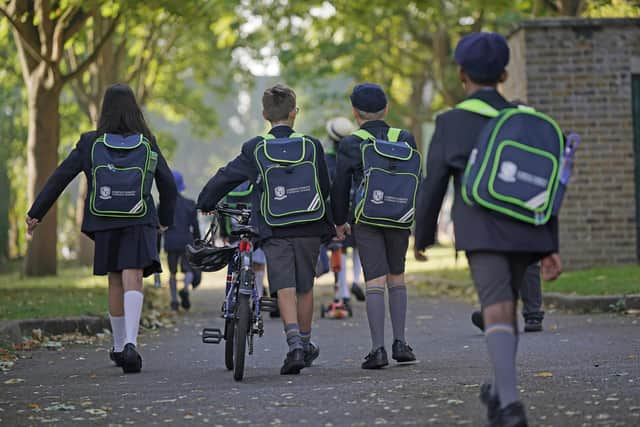Northern Ireland schools: Transport strike by Unite, SIPTU and GMB members in Translink to cause 'significant disruption' to 60k pupils before Christmas
and live on Freeview channel 276
The Education Authority (EA) made the comment after members of Unite, SIPTU and GMB trade unions voted overwhelmingly to strike over what they said was a pay freeze.
Earlier this week teachers across NI said they would consider longer periods of strike action if no resolution can be reached in their long-running dispute over pay, union leaders have warned.
Advertisement
Hide AdAdvertisement
Hide AdThe leaders of the five recognised teaching unions have predicted that strike action planned for later this month and next year will close every school in the region.


The transport union ballot results are unprecedented in that they were conducted by all three unions representing frontline Translink workers.
Unite General Secretary Sharon Graham laid the blame for the pending strike with the Secretary of State for Northern Ireland.
“Chris Heaton-Harris has imposed a brutal budget settlement on the Department for Infrastructure which provides no funding for a pay increase for bus and rail workers," she said. "Translink workers have voted overwhelmingly for strike action – the Secretary of State must now intervene to properly fund public transport in order to avoid what will be a debilitating and disruptive strike action on the public transport system of Northern Ireland.”
Advertisement
Hide AdAdvertisement
Hide AdUnite reported a vote for strike action of 95.5%; GMB of 95.6% and SIPTU of 93.1% - all on turnouts of 60% to 70%.
The votes were taken by all three unions over a three-week period and followed what they said was a zero-percent pay offer by Translink management with no date being provided for talks on an improved pay offer.
SIPTU Senior Organiser Niall McNally highlighted the impact strikes would have in the pre-Christmas period.
“Strike action is always a last resort for workers and their unions. No worker wants to be in the situation of taking strike action in the run-up to Christmas but Chris Heaton-Harris’ budget settlement leaves our members with no alternative. We recognise the dislocation and economic scarring that will result from a public transport strike but our members cannot accept a pay freeze in the midst of the worst cost of living crisis in a generation.”
Advertisement
Hide AdAdvertisement
Hide AdA spokesperson for the Education Authority (EA) said the education of almost 60,000 children could be disrupted.
She said: “While industrial action by frontline public transport trade unions has potential to cause significant disruption – over 57,000 children and students are in receipt of Translink travel passes - we will not know the full impact on home-to-school transport until the specific action is detailed by the relevant Unions.”
Dr Graham Gault, national secretary of school leaders' union NAHT (NI), said they had sympathy with the transport unions.
"Having just announced strike action with the other education unions, we understand only too well the anger employees feel when they are told there is no money for a much-needed increase in pay," he said.
Advertisement
Hide AdAdvertisement
Hide Ad“While this is likely to have an impact on pupils and families, ultimately, the blame lies squarely with the UK government, which needs to stop treating Northern Ireland with disdain and properly fund public services.”